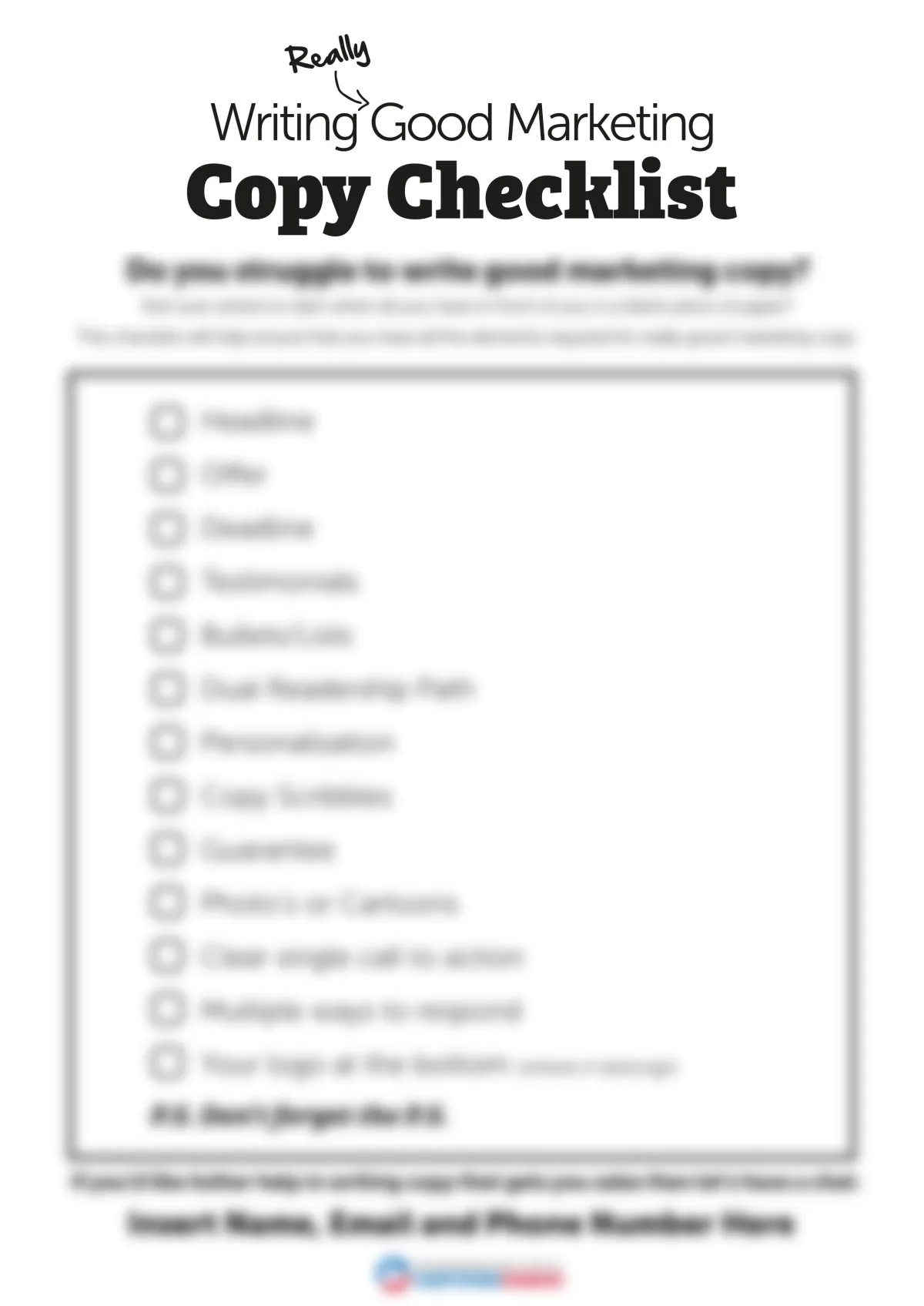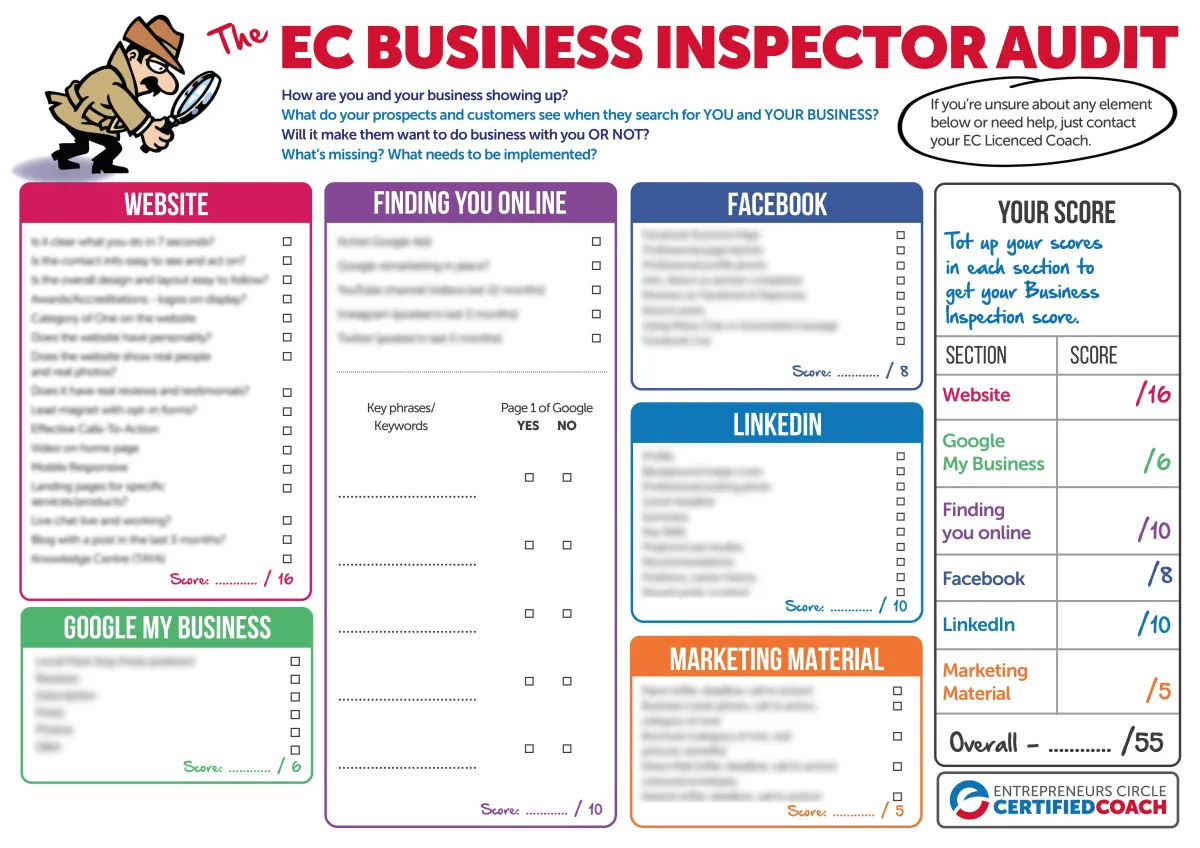Your Free Business Resource Guides
These free generic business guides and tools are relevant for Aesthetic Clinic owners. They provide succinct and actionable practical advice that can help you to grow your business…
Free Resources & Downloads…

The £10,000 per Hour Guide To How You Spend Your Time
To make big leaps forwards in your aesthetic business you need to spend time working on the big ‘stuff’. This’ll help you…

9 ‘Sneaky’ Tricks To Triple your Email Conversions
Email Marketing is still one of the most valuable marketing tools for clinic owners and this will help you get more sales from your emails.

Building Your Dream List
There’s a real art to identifying and getting in front of your ideal aesthetic customers. This blueprint will help you get started…

Finding Your Customer Avatar
Marketing to the right people will save you a lot of wasted time and money. Find out who you should target with this workbook.

Copy Checklist
This checklist will help you to plan and write more compelling marketing copy.

Marketing Spend Calculator
Work out what you should be spending to market your aesthetic services to get a new customer.

Mindset Checklist
How you think is often more important than what you do. Here’s a checklist to test your mindset.

What’s Your Time Worth
Complete this quick calculation to find out how much your time is truly worth

Professional Business Person
Take the test to find out whether you are a Professional Business Person or a Wannabee?

Where Are You On The Pyramid?
80% of Business Owners are wrong - about everything! Here’s the proof…

The 7 Secrets
This guide alone could transform your aesthetic business. Embrace and implement the 7 secrets to achieve a greater level of success.

LinkedIn Lead Generation
Are you using LinkedIn to connect with your target market? This Guide is full of proven strategies, tactics and scripts to help you generate quality leads through the LinkedIn platform.

A World Class Follow Up System
Don’t leave money on the table. Make sure you’re working the leads that you get.

The Business Inspector Audit
What do your prospects and customers see when they search for you and your aesthetic business? Use this checklist to see how you score with Google, Facebook, LinkedIn, your marketing material, website and more…

Website Audit Checklist
How does your clinic website stack up? Use this checklist to understand how and where small improvements can help you to deliver big results with your website.

Wheel of Life
How happy are you with each element of your life? This’ll get you thinking and is worth spending 10 minutes to complete.


Your 11 Foundation Blocks
These are the things that all businesses need to have in place to be successful.
For more insights about running an aesthetic clinic, please see my Blog posts below

Is “Aesthetics” Lagging the “Beauty” Sector in the race towards a more sustainable future?
We are all on a journey where we will to continue to experience change driven by sustainability issues that will start to impact all of our lives and restrict choices.
Certain sectors are already grappling with huge consequences to their business model, with proposed restrictions on gas boiler installations and combustion engine restriction in 2035 in the UK.
When I was growing up activism around, what was then termed “Green Issues”, was limited to a few deeply committed people such as Greenpeace, who were often not represented in the best light in national media.
In the last few years, Greta Thunberg has mobilised a new generation of millions of “young activists” to participate in school strikes and rallies in cities in the UK and around the world.
Some of these demonstrations are aimed specifically at aspects of the beauty/aesthetic sector with a “Plastic Free Beauty Day” march on 17th June this year in London. (2)
All of this is driving consumer behaviour in how and where they spend their money…including the “beauty” and “aesthetic” sectors.
This is a significant shift from what consumers wanted five or ten years ago when the gold standard for brands was to deliver a great product or service.
Now companies (large and small) are expected to go much further, to stand for something beyond their products. Beauty and aesthetic brands and companies will increasingly have to prove that there is a reason for their existence beyond profits, one that contributes in some way positively to the environment, to society, or to supporting individual expression.
A recent study by the British Beauty Council found that of 23,000 beauty shoppers, almost half (48%) are looking for more information, clarity and transparency about beauty brands’ values and commitments to the environment (3).
In fact, the British Beauty Council has launched a Sustainable Beauty Coalition with a wide range of industry leaders (including Boots) represented to address sustainability issues which has resulted in the publication of a 48-page sustainability report called “The Courage to Change”.
The report highlights compelling reasons for taking action noting that “current industry efforts are too patchy and uncoordinated”, and that the sector “must move together, from the smallest independent, to the largest corporate brand”.
In addition, they released a “Planet Positive Guide” aimed at the consumer talking about sustainability issues within the beauty sector and highlighting how to avoid “Greenwashing” – where “Green” marketing is used deceptively to persuade the public that an organisation's products, aims and policies are environmentally friendly.
Like the Greenpeace activists highlighting climate change in the 80s, there were trailblazers in the beauty sector promoting sustainability causes – with the late Dame Anita Roddick at the forefront with the Body Shop.
However, skincare powerhouses such as L’Oreal (the largest skincare company in the world) have latterly joined the cause – with “We Fight Climate Change” emblazoned across their website and commitments to SDG targets including: “By 2030, 95% of our ingredients will be bio-based, derived from abundant minerals or from circular processes” and “By 2025, 100% of our plastic packaging will be refillable, reusable, recyclable or compostable”.
The pressure to incorporate sustainability goals into future plans for companies quoted on stock exchanges around the world is also being driven by investment houses. In 2022, Larry Fink, the CEO of Blackrock, the largest investment management company in the world managing over $7 trillion of funds, wrote an open letter to CEOs warning them about a fundamental reshaping of finance in relation to climate change. Companies can no longer ignore this subject as it is becoming a greater determining factor in deciding where huge sums of pension fund moneys are invested with a resultant impact on share price.
Smaller “disrupter” companies are entering the sector with claims that aim to resonate with consumers such as “palm oil free”, “vegan”, “Recyclable or refillable packaging”, “sustainable ingredients” etc.
As you can see, there is real momentum in what we, in the “Aesthetic Industry” would call the “Beauty Sector” to try and highlight and address sustainability issues, and this is being increasingly covered in professional beauty magazines and industry events aimed at that sector.
As we know, however, the consumer does not always understand the blurred boundaries and definitions in our industry as, in reality, they can often access the same skincare brands and treatments promoted in an “Aesthetic Clinic” as they can in a “Beauty Salon”.
I have come to wonder why “Aesthetics” seems to be lagging in talking about and addressing sustainability issues that we are all very aware of, especially as the “Aesthetic industry” aims to differentiate itself as a sector based on many ethical issues related to educating and protecting the consumer about how to buy the right treatments safely.
Also, one definition of “Aesthetics” is “a set of principles concerned with the nature and appreciation of beauty” – and many of the issues relating to sustainability are based on preserving the beauty of the natural world that we live in.
In talking to practitioners/ clinic owners and smaller suppliers in recent months, I think a lot of inaction comes down to a lack of understanding of what they can practically do to make a difference, alongside a belief that this subject is not yet an important factor that their customers take into account.
However, having worked with my daughter, Zoe, who runs Authentic Aesthetics in Kenilworth, I have seen first-hand how her clients have reacted to messaging based solely around sustainability. Zoe is a millennial and sustainability issues are important to her, and she has done a number of things personally and within her business to try and address this.
However, she became increasingly frustrated with a well-known aesthetic skincare brand that she had used for many years, in regard to sustainability issues. She had written to the supplier a number of times highlighting this – but the supplier failed to address any of her concerns even resulting in an email that said, “maybe we aren’t the right company for you”!
This spurred her on to find a skincare company that addressed her concerns – and, with careful messaging, within 2 months, she changed over the majority of her skincare clients to this new brand.
I must admit, I was sceptical that customers would change to another brand purely on sustainability messaging and was genuinely surprised at the enthusiastic response and comments from her customers supporting Zoe’s endeavours to run a more sustainable business.
This led me to personally explore the dynamics around business and sustainability with a course that I undertook with Cambridge University where I have become convinced, from many businesses case studies that, implemented correctly, incorporating more sustainable business practices into an aesthetic clinic can be a powerful differentiating factor from a marketing perspective.
I believe we are all personally on a sustainability journey, where the noise around different issues will get louder and louder, and where the Government will increasingly legislate to ensure that they hit our countries commitments to Global Sustainability Targets.
Businesses that strive to develop a close ongoing relationship with their customers, and start to embrace this journey, incorporating meaningful changes and discussing this in their marketing will seem more relevant than those that ignore it.
In addition, many clinics employ millennials who have a greater interest in sustainability issues than older demographics. Attracting and retaining staff can be a challenge for any business – but having a plan to address sustainability issues (rather than just a focus on profit) can make you a more attractive place to work.
For those that really understand where all of this is going, they will become ambassadors for sustainability, forging connections with like-minded businesses from other industry sectors in their locality – enabling them to really benefit from the resultant increased visibility and differentiations versus other local aesthetic providers.
None of this is going to be easy, and there are many things that will be difficult to change, due to innovation issues, or capital requirements – but starting small and gradually making progress will change your focus to ensure that this is a subject that you take positive action on, rather than watch others lead the way.
If you’d like to join suppliers, clinic owners and practitioners who are interested in learning more about sustainability issues related to aesthetics, and making positive changes in their businesses, please join our “Sustainability in Aesthetics Facebook Group.
1) Corporate Report- Implementing The Sustainable Development Goals. July 21. https://www.gov.uk/government/publications/implementing-the-sustainable-development-goals/implementing-the-sustainable-development-goals--2
2) Awareness Days – Plastic Free Beauty Day 2022, Page accessed 7th Jan 22https://www.awarenessdays.com/awareness-days-calendar/plastic-free-beauty-day-2022/?fbclid=IwAR2AD8AWOYDLbxULHVMayk1906Ey4-SkU8SMj0HPmiW1bUN2se0Xktglaz8
3) The British Beauty Council's Sustainable Beauty Coalition launches the Planet Positive Beauty Guide to help consumers avoid "greenwashed" products, 29 Oct, 2021, CISION PR Newswire, Page accessed 7th Jan 22 https://www.prnewswire.co.uk/news-releases/the-british-beauty-council-s-sustainable-beauty-coalition-launches-the-planet-positive-beauty-guide-to-help-consumers-avoid-greenwashed-products-873068605.html

© GenieAI (Licensed Coaches) 2025 . All rights reserved. Terms and Conditions | Privacy Policy
